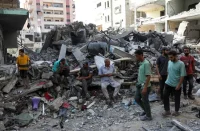Let’s begin by noting that isn’t the first time England has had the kind of unrest we’re seeing now. The first racially motivated mass riots happened in London’s Notting Hill area in 1958. It was decided afterwards to hold an annual carnival in Notting Hill, a sign, as it were, of racial peace, tolerance and multiculturalism. In April 1981, serious riots occurred again in another part of London, in Brixton. Members of immigrant communities pelted police vehicles with Molotov cocktails, looted shops and broke windows; but it was decided not to hold a Notting Hill-like carnival in Brixton. Perhaps that was because the authorities in London had begun to realize a simple truth—if a carnival were held after every riot, within 30 years London would be the world’s entertainment capital. That’s not a bad idea on principle, but it would look pretty strange.
It’s symbolic that the current race riots in England are happening against the background of the events in Libya, Syria and Arab countries in general, which bad old England, together with France and others, had a hand in. You might even say that it played a direct if not always clear role in organizing the “color revolutions” in the Islamic world. So the reaction by the governments of Iran and Libya to the current political situation in Great Britain should not come as a surprise.
Libyan Deputy Foreign Minister Khaled Kaim called on British Prime Minister David Cameron to resign because he had “lost all legitimacy.” “Cameron and his government must leave after the popular uprising against them and the violent repression of peaceful demonstrations by police,” Kaim told the Libya’s JANA news agency. “These demonstrations show that the British people reject this government which is trying to impose itself through force.” Kaim urged the UN Security Council and the entire international community to “not stay with its arms crossed in the face of the flagrant violation of the rights of the British people.”
The ironic thing about that statement is that it sounds a lot like the justification for the UN Security Council resolutions on Libya in February and March.
Iran hasn’t refrained from commenting on the events in Britain either. Iranian Foreign Ministry spokesman Rahmin Mehmanparast said, “The British government should order police to stop violent confrontation with the people. The government must engage in a dialogue with the protesters and listen to their demands so that the situation returns to normal.”
Curiously, some of the liberal Western media have reacted in a similar fashion. Many European observers believe that, first of all, public opinion in Europe is intolerant of people from some Asian and African countries, and the poor immigrants find that exasperating. Secondly, the measures used by Western law enforcement agencies against the emigrants are excessively harsh. For example, the German political scientist Alexander Rahr says, “The West plays the hypocrite. After all, when young men demonstrate in North Africa or in Asian countries they immediately start talking about a democratic revolution. When young people take to the streets in the cradle of democracy—England—the police use extremely harsh measures in cracking down on them, beating them with clubs and arresting them; and the press sounds off about the looting without citing any political motive.”
There’s actually a lot of truth in what Rahr says. By some strange coincidence, Britain’s current rioters haven’t thought to use political slogans like “Down with the tyranny of Elizabeth II!” or “Down with the rotten monarchy!” However, that omission may be rectified next time if there is outside interest.
As for police brutality towards the young people who have taken to the streets, it’s true. The British police began acting harshly as soon as they received approval from the top political leadership.
The London police were able to respond adequately to the rioting in the capital for the first time in days on August 10, but only after they received permission to use rubber bullets and water cannons. Also, additional police were brought into London, and about 16,000 bobbies began patrolling the capital. However, concentrating police forces in London weakened law enforcement in other British cities, and gangsters in Nottingham, Liverpool and Manchester were quick to take advantage of the situation.
But don’t rubber bullets cause deaths and injuries? Isn’t that police brutality? If it is, why doesn’t Obama, the outspoken opponent of cruelty and tyranny, say something about it?
As recently as July 31, Obama was shocked by the actions of the Syrian government against its own people. According to Obama, of course, the violence demonstrated the “true nature” of the Syrian leadership. Moreover, Obama said that history will judge President Bashar Assad, who has resorted to “torture, corruption and terror” (BBC). Earlier, J. J. Harder, press attache at the US Embassy in Damascus, described the situation in Syria as warfare by the government against its own people. British Foreign Secretary William Hague said he was outraged because Syria didn’t allow its people to protest on the eve of Ramadan.
It would be interesting to know how outraged Hague is now that the London police are stopping protests there?
There’s no doubt that simple looting is the driving force behind the senseless and ruthless British outbreak. However, there likewise is no doubt that looting was a driving force in the Arab revolutions. The only difference is that the Arab revolutions became organized political demonstrations through outside intervention. However, everything is far from simple with regard to organization.
Just a few months ago the media the words “Twitter revolution” was everywhere in the media. Oh, of course! There was revolutionary romanticism in the air. Twitter! Revolution!! Democracy!!! Internet portals were squealing with delight. “May Twitter be with them!” (i.e., with the Arab revolutionaries), they cried. And: “Twitter and Facebook have been hopping these last few days. Groups and accounts have begun appearing, and their users began—by themselves—preparing to stage protests against the government. The date of the demonstrations appeared—January 25. There were no political forces or charismatic leaders behind that movement. Just people who cared and who were tired of living the way they had been living; and Tunisia showed that change was possible.”
We’re amazed that the Egyptians have managed to be undernourished given the extent of computerization which made it possible to organize a broad social movement in Egypt. They obviously spend all of their cash getting online.
England is another matter altogether. Its people certainly have lots of computers. So what to do?
British authorities are considering disabling Twitter and BlackBerry Messenger during the riots. They’re already talking to the service providers.
On August 11, Reuters quoted a government spokesman as saying the government knows they have been used; the question is whether it can do something to deal with the problem. “We are working with police, the intelligence services and industry…” He added that nothing has been proposed yet. British police reported earlier that the looters were coordinating their actions through social networks and BlackBerry Messenger.
All of that is strange, to say the least.
If there is organization, it means there are organizers. It doesn’t matter what their motives are. Their motive now is to show their strength. It’s as though they’re saying, “Don’t touch us.” What they will say tomorrow?—that’s the question European bureaucrats need to think about now. And not only British bureaucrats but European bureaucrats in general, because things like this have happened time and again in France; and other countries can expect something similar.
There’s a curious aspect to what’s happening in England.
 As an example example, one person featured in a recent police report was Chelsea Ives, ambassador for the Summer Olympics to be held in London next year, 2012. During the riots, the 18-year-old professional athlete on whom such high hopes were riding took a TV set from a looted store, helped trash a police car and was part of a group that robbed Phones4U and Vodaphone mobile telephone shops.
As an example example, one person featured in a recent police report was Chelsea Ives, ambassador for the Summer Olympics to be held in London next year, 2012. During the riots, the 18-year-old professional athlete on whom such high hopes were riding took a TV set from a looted store, helped trash a police car and was part of a group that robbed Phones4U and Vodaphone mobile telephone shops.
While looting the shops, she joyfully shouted, “This is the best day ever!” Chelsea also posted comments on her Facebook page expressing approval for the actions of the rioters. Ives said the police are to blame for the riots, and it was the shopkeepers’ fault if they were looted. Hardly anybody would venture to claim the young girl was suffering from too much social responsibility.
Chelsea Ives became the “face of the 2012 Olympics” for a reason. She was proof that immigrants can be integrated into British society. She was an excellent student, an athlete, a beautiful girl and simply a nice person. So what happened? Chelsea’s conduct gives rise to a reasonable question for members of the British government: “Do you guys really hope they will ever become part of British society?”
But that’s not all.
As I said earlier, immediately after the riots began many liberal European media outlets argued that the looting and vandalism by unhappy British subjects was prompted by poverty and the unsettled nature of their lives. Is that true? The fact is that disadvantaged immigrants were hardly the only rioters. The Daily Mail reported that quite well-off people took part in the rioting. For example, one of the rioters was was 19-year-old Laura Johnson, daughter of a millionaire and a student at a prestigious private school. In court, she was charged with stealing £5,000 worth of electronic equipment. The girl obviously was in dire need when she rushed out of a demolished shop with a couple of TV sets, a microwave oven and several mobile phones. Laura’s parents supported their beloved offspring in court. Why not? Isn’t the acquisition of property, even by robbery and theft, a characteristic of every bourgeois, and especially the British?
And yet… Could it be time for the British government to put things in order at home rather than poking their noses into the affairs of other countries?
A chronological note:
On August 4 the London police outfit stopped a private taxi to check it out. The passenger, 29-year-old Mark Duggan, a son of “colored” immigrants, put up armed resistance. A policeman was injured in the ensuing gunfight, and Mark Duggan was killed. On the evening of August 6, a crowd of several hundred people gathered near the Tottenham police station. The protesters initially denounced the “police high-handedness” and then began rioting and looting. So-called “Molotov cocktails” have been thrown. The ethnic riots have later spread beyond London to Birmingham, Manchester, Liverpool and Nottingham.
Source: New Eastern Outlook














When classless riots and looting break out you know you have a problem. The British public see all too well tens of thousands of dead Iraqi’s for no apparent reason. Politicians in expenses scandals and even claims for Moat cleaning. A generation of students with worthless degrees and no hope of work. A coalition government caught in the headlights of a bankrupt country and merely sitting and taxing their way out of a mountain of debt. They are also incapable of apportioning blame on the mess as it is too embarrassed to highlight the New Labour pre war budget of irresponsible financial practises and lending, And massively inflated property prices. Teflon Tony has had it away on his toes and by my reckoning we are looking at another seven years of misery.